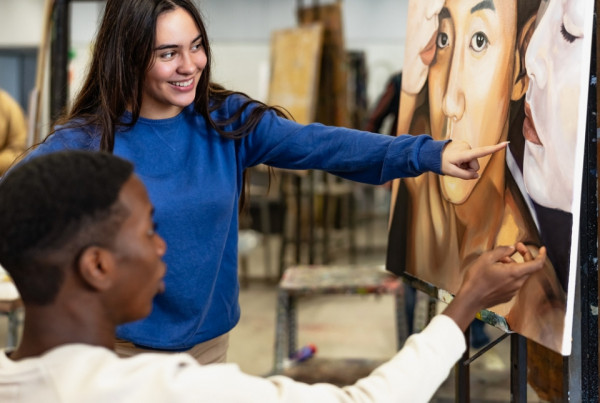
University of Bolton, Deane Road, Bolton. BL3 5AB
Tel:
Email:


“At the University of Bolton, we take great pride in providing a quality, supportive learning environment for our students.”
Professor George E Holmes DL | President & Vice Chancellor
“...tutors are very supportive and you’re not just a student ID number, at this university you are an individual with a name.”
Ellisse Vernon | BSc (Hons) Adult Nursing
Back to menu
Back to menu
Study with an Off-Campus Partner
Back to menu
Back to menu
University of Bolton, why we are the right choice
Location - Bolton, Greater Manchester

30/05/2023
Are you passionate about art? Do you find yourself fascinated by brushstrokes? Do you like the play of colours and the hidden messages of artistic masterpieces? If the answer is YES, you may want to transform your unending creativity into a rewarding job; a job that allows you to use your creative vision to inspire and impact the lives of others. But, in all your love for creativity, a question continues to exist, throwing a shadow of doubt; is a fine art degree worth it?
An artist's career might look unclear in a society driven by practicality and economic stability. Many people doubt the reliability and worth of this degree. (Mostly because our society values measurable and quantitative success.) But behind the world of numbers and statistics is a vibrant and fluid world, an arena where creativity has no limits and self-expression is a powerful language.
Join us on a trip as we explore the benefits, challenges and possibilities that await people who follow their aesthetic goals. We will expose secret facts and shed light on the mysterious field of fine art together. So, tighten your seatbelts; we are going on an artistic trip!
What is Fine Art?
It's a term that carries an air of mystery and suspense. But what does it all mean?
At its core, this discipline is an expression of human creativity. Creativity that goes beyond boundaries and challenges the norms of society. It includes a wide range of innovative fields, such as painting, sculpture, photography and performance art. It is an area where imagination takes the spotlight. It's a field where players breathe life into their ideas; a platform where feelings turn into physical objects that attract and inspire us.
This field is a harmony of colours, forms and textures that are woven together with great intention. It is a language that reaches deep into our souls and encourages us to examine the beauty, complexity and errors of the human experience. Artists become storytellers via fine art. They create stories that trigger emotions, encourage thinking and challenge our views of the world.
Yet, this track is much more than beautiful visuals. It is a medium through which creators maintain an ongoing dialogue with the past, present and future. It reflects the spirit of historical moments and changes in society. It breaks through barriers, starts conversations and acts as a driver for change. It can challenge social rules and reshape our ideas of beauty and truth.
This area reminds us to pause, think and connect with our inner selves. It encourages us to look past the surface and into the depths of human existence. It promotes individuality and tells us to be ourselves and accept our unique views.

What is the difference between Art and a Fine Art Degree?
Fine art & art! These words often clash, creating miscommunication and blurring the difference.
Art, in its broadest meaning, includes a wide range of creative expressions. It includes everything from painting and sketching to sculpture, photography and more. It is present in museums, galleries, public areas and even on streets. It is a universal language that connects individuals across cultural and economic boundaries.
However, a fine art degree is a formal education that focuses only on the study and practice of fine art. It is a structured course by universities and schools committed to developing creative skills. This degree includes a more in-depth study of the technical, theoretical and conceptual elements of arts and creativity.
Both these degrees need creativity, but a fine art degree provides an organised structure for aesthetic growth. It teaches students about history, creative processes, critical analysis and theoretical frameworks. This focuses on experimentation, research and skill development under the guidance of experts.
Is a Fine Art degree worth it?
There is no correct answer to this question that lingers within every aspiring artist. On one side, this world might appear unpredictable and financially risky. But, getting a degree provides unique benefits and opportunities.
A fine art degree includes more than simply improving your technical skills. It offers a structured syllabus that allows gurus to express themselves, experiment with various mediums and learn from skilled mentors. The course often includes art history, critical analysis, theoretical frameworks and provides a more in-depth grasp of this expressive field.
The networking opportunities provided by this degree are one of its primary benefits. Students can meet other students, professionals and future collaborators. Exhibitions, presentations and maestros’ residencies all serve as venues for exposure and recognition. It provides access to grants, commissions and other professional opportunities.
The value of this degree is a very personal choice. It all depends on your passion, commitment and faith in the changing power of this field. A degree provides basic information, skills and possibilities. But success comes from the artist's creativity, dedication and unique vision.
Which degree is best for Fine Art?
Many aspiring artists choose to go after a Bachelor of Fine Arts (BFA) degree. It provides an in-depth curriculum that focuses on fine art subjects. Students with a BFA degree learn about many innovative artistic methods. They also learn about history, critical analysis and conceptual frameworks. The BFA degree offers a well-rounded education and helps develop technical and critical thinking skills.
A Bachelor of Arts (BA) degree in Fine Art may be the best option for students looking for a broader academic background. This degree combines studies in fine art with a liberal arts program. It provides an opportunity to study various courses. Courses offered include humanities, social sciences and natural sciences. This degree supports interdisciplinary methods and blends various viewpoints into practice.
A Master of Fine Arts (MFA) degree is an excellent choice for people who wish to continue further studies in fine art. An MFA programme allows for further specialisation and expressive exploration. It promotes high technical abilities, critical thinking and conceptual growth. An MFA degree focuses on individual creative practice and provides a platform for creators to develop their visionary expression. It also allows people to push the boundaries of their chosen media.
Can you make money with a Fine Arts degree?
Is it possible to make money with a fine art degree? Yes! Your fine art degree provides a solid foundation for creativity. It also opens the door to various financial opportunities and may help you sell your work in creative industries. You can also teach, provide curation, therapy, consulting, restoration and more. But you must know that it needs dedication, passion and active promotion.
Fine Art Jobs:
There are several job options for creative individuals looking to convert their passion into a career. Let's have a look at some fascinating and diverse careers; ones that might feed your gifted ambitions.
One option is to try out a career as a professional artist. You may use your fine arts degree to make and sell work through galleries, exhibits and online channels. Whether it's painting, sculpture, photography or digital art; you can showcase your work. Creating a good portfolio, developing a unique style and marketing your work will help you attract buyers and collectors. It will find people who are ready to invest in your talent.
Working in the creative industry is another option. Your fine arts degree will prepare you for various careers in advertising, design, illustration and multimedia production. Working with businesses or freelancing allows you to use your artistic skills while producing a steady income.
You can also work as a curator, who serves as the art world's gatekeeper. You will choose and display work for exhibits. You will be displaying the skills of both young and recognised artists. Curators play an important role in describing the story and context of the exhibit. They send visitors on a visual journey that tells tales and leads to discussion.
Art educators also lie within the domain of this vast field. They carry the flame of imaginative knowledge and inspiration and will share your knowledge and enthusiasm with budding artists of all ages. They will cultivate creativity, technical skills and a hunger for creativity in your students.
Another possibility is to become a therapist. They use art's healing power to help those with physical, emotional, or mental issues. They assist patients to explore and express their emotions via creative treatments. And they do this by boosting self-awareness, communication and personal growth.
Another fascinating professional path is that of a director. They are the creative minds behind visual storytelling in a variety of sectors. They supervise the project's creative direction and ensure that visual aspects are in line with the desired message and brand identity.
Lastly, you could work as a conservator or restorer. They preserve the beauty and integrity of historical artworks. Their expertise allows future generations to understand the cultural and historical value of great pieces, keeping them safe for years and years.

Studying a Fine Art degree at the University of Bolton:
A fine art degree from Bolton University is an exciting adventure that will feed your creativity. Thanks to a lively curriculum and friendly teachers, you'll experiment with many techniques. You’ll get hands-on experience and networking opportunities through innovative spaces and display areas.
Our welcoming artistic community promotes experimentation and cooperation. Bolton University provides personalised help, industrial insights and a diverse cultural environment. Immerse yourself in a transformative experience where you'll uncover your identity and build a passionate future.
Allow Bolton University to be your catapult into a rewarding artistic career.
Conclusion:
The value of a fine art degree is determined by your enthusiasm, dedication and trust in the power of creativity. While a degree may not guarantee fast financial success, it can provide a unique mix of benefits. These include a planned curriculum, networking opportunities and the development of key skills. It is a stepping stone to a rewarding and powerful artistic career.
If you're ready to begin this life-changing journey, look into the fine art degree at Bolton University. Learn how our thriving community and forward-thinking attitude may help build your artistic destiny. With a degree from Bolton University, let your imagination run wild.
To know more about our programs, contact us at enquiries@bolton.ac.uk. Or call +44 1204 903142 to talk to a member of the team. Start your journey towards a rewarding career right away and experience #UniAsItShouldBe!